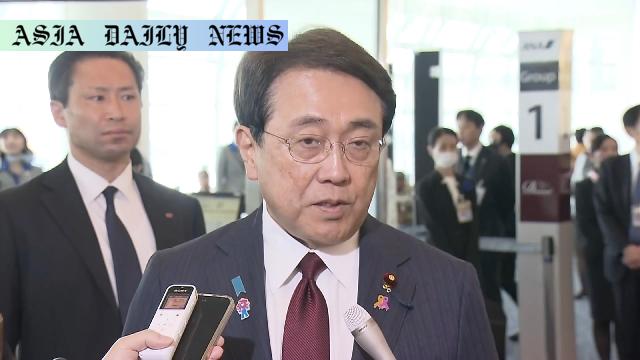Tariff Talks: Japan’s Economic Revitalization Minister heads to Washington for crucial discussions on US tariffs.
Japan’s Minister Akazawa Ryosei travels to Washington for tariff talks.
US tariffs have severely impacted the profits of Japanese companies.
Negotiations may focus on cars and agricultural market access for the US.
Japan seeks to protect its interests while promoting economic ties.

Introduction to Japan’s Tariff Talks
Japan’s Economic Revitalization Minister, Akazawa Ryosei, embarks on a significant mission to Washington amidst ongoing concerns over tariffs imposed by the US administration under President Donald Trump. This marks the commencement of discussions that could reshape trade policies, impacting both nations economically. With reduction in the profits of Japanese businesses, the negotiations aim to forge pathways that benefit both Japan and the United States, while safeguarding Japan’s critical industries.
An Economic Disruption: The Context of US Tariffs
Under the Trump administration, trade relations between the US and Japan have faced challenges, primarily due to newly imposed tariffs. These measures have not only impacted the profitability of Japanese businesses but have also raised concerns about broader economic disruptions. Japan’s investments in the US economy, including significant contributions to employment and technology, could serve as key leverage points during these negotiations. Akazawa is tasked with addressing these economic imbalances by highlighting mutual benefits, promoting existing trade partnerships, and showcasing Japan’s integral role in the US market.
The Key Areas of Discussion
One of the central elements of the forthcoming talks revolves around the US potentially urging Japan to increase imports of American-made vehicles. With Japan being a major exporter of automobiles to the US, any such request could introduce severe market imbalances for Japanese businesses. Furthermore, the Trump administration is likely to push for opening Japan’s tightly regulated agricultural sector, a domain traditionally protected due to its cultural and economic prominence. Akazawa must carefully navigate these demands to ensure that Japan maintains its sovereignty in critical industries while fostering international collaboration.
Balancing Economic Interests and Trade Partnerships
Akazawa’s approach to these negotiations demonstrates Japan’s commitment to resolving conflicts diplomatically while maintaining core economic interests. A key consideration involves highlighting the substantial investment Japan has made in the US—ranging from corporate presence to job creation—and seeking recognition for these contributions. By articulating a mutually beneficial narrative, Japan aims to counterbalance the US’s push for increased market access, advocating for tariff measures that do not disproportionately harm Japanese businesses or disrupt its domestic markets.
The Challenges Ahead
The prospect of opening up Japan’s markets to more US agricultural products raises concerns among Japanese officials. Many fear that such measures could alter traditional market structures, impacting local industries and consumer preferences. Additionally, the demand for Japan to import more US vehicles could test the nation’s ability to protect its key automotive sector from external pressures. These concerns necessitate a cautious and strategic approach during negotiations, as Japan seeks to uphold its economic stability while fostering international goodwill.
Conclusion: A Step Toward Economic Cooperation
Minister Akazawa’s mission to Washington symbolizes not just a chance to resolve immediate tariff disputes but also an opportunity to reinforce long-term economic partnerships between Japan and the US. While challenges persist, particularly in balancing market access and domestic interests, these talks could pave the way for greater collaboration, reflecting both nations’ shared commitment to trade and economic prosperity. Japan’s careful yet determined approach underscores its role as a global economic player, ready to engage in dialogue and adapt to evolving trade dynamics.
Commentary
The Importance of Balanced Negotiations
The Japan-US tariff negotiations represent a pivotal step in addressing the growing economic challenges that impact both nations. Fair trade policies are essential for maintaining stable economic ties, and Japan’s approach reflects a willingness to engage in constructive discussions to protect its industries while promoting cooperation. Minister Akazawa’s preparedness to listen to US concerns demonstrates diplomacy in action, a cornerstone of effective international relations.
Economic Implications for Both Nations
While the US seeks greater access to Japan’s markets for its vehicles and agricultural products, these demands come with significant risks for the Japanese economy. Japan is rightly cautious about exposing its industries to fluctuations that could destabilize established sectors. At the same time, the US’s focus on tariffs highlights its objective of reducing trade deficits and creating domestic job opportunities, which underscores the delicate balance these negotiations must achieve for both parties.
Looking Toward Sustainable Solutions
A successful outcome from these discussions could set a precedent for equitable trade policies in an era of shifting global alliances and economic pressures. Both nations must focus on shared benefits and long-term cooperation, ensuring that no single-sided interests undermine the partnership. Japan’s insistence on emphasizing its contributions to the US economy provides a foundation for these talks, presenting an opportunity to address concerns comprehensively.
Final Thoughts
Trade negotiations are often complex and driven by competing priorities. However, Japan’s measured approach to engaging with US officials reflects a commitment to finding common ground without compromising its core interests. These talks, while challenging, hold the promise of reinforcing economic ties that have long defined the Japan-US relationship. It is a critical moment that requires diplomacy, foresight, and mutual respect to ensure a positive trajectory for both nations.


